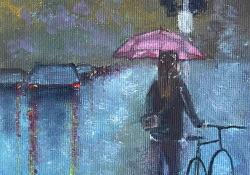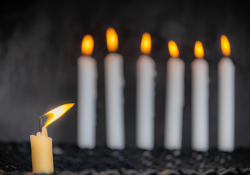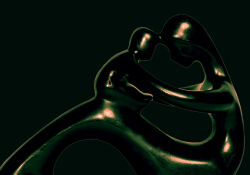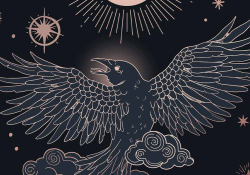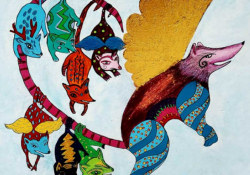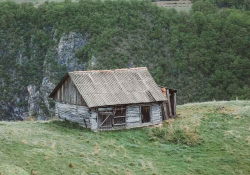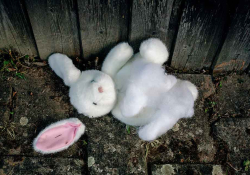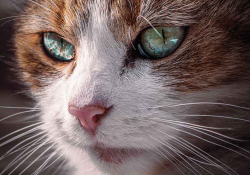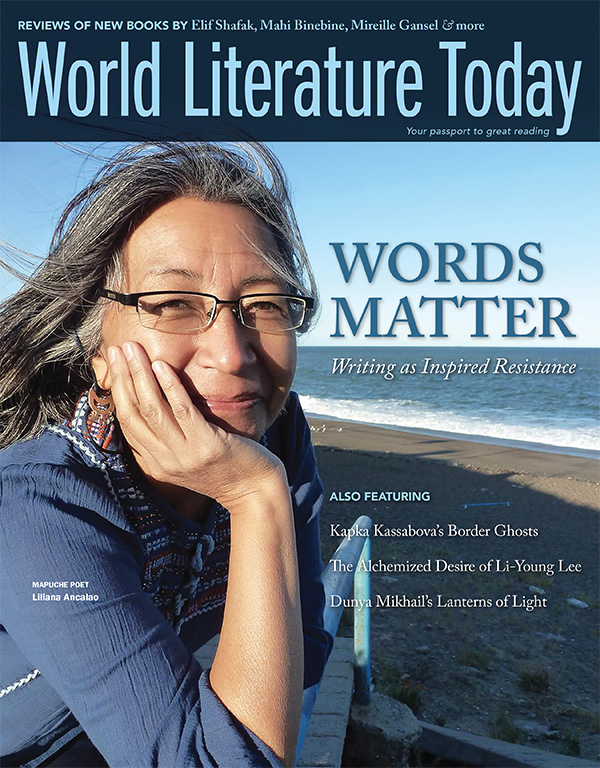In Nocere
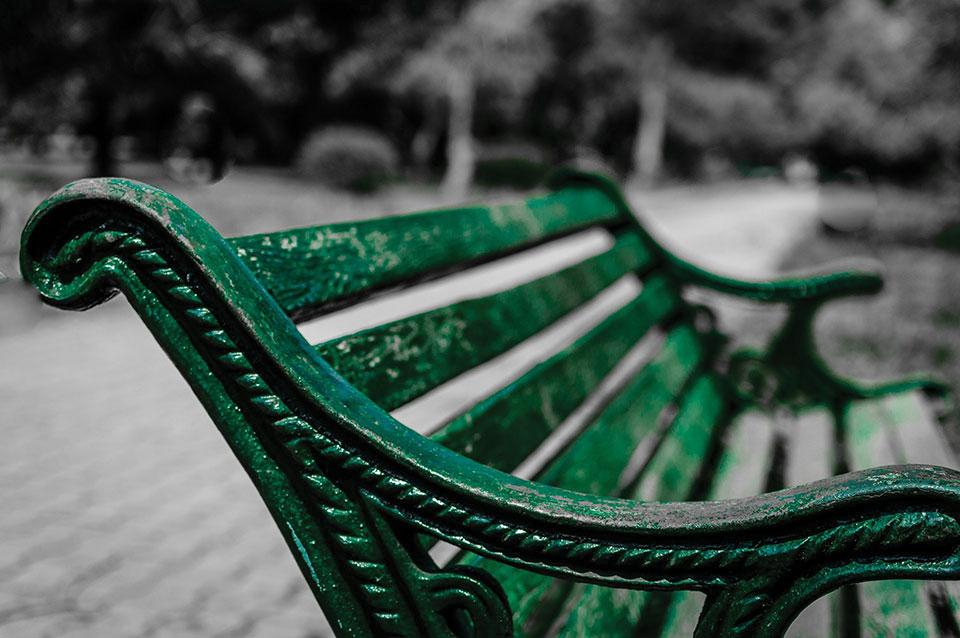
Through story and stranger, two fallen-out friends mediate their way back to one another in the Edinburgh Zoo.
M
eet me in the waves, you bad fisherman, and I will give you Death by Water.
Those were her words, the redheaded girl from Tongue Bay. I had driven those slow miles north, with loose folios on my passenger seat, hoping by the time I arrived I would be lonesome enough to write one good story. When I pulled into the hamlet, she was standing on the highest crown of browned grass, wild as a spirit below all her blown hair. My lashes were caked with coastal salt; through them, I saw only her.
My former schoolmate Damien and I are on a carved wood bench at the Edinburgh Zoo, before holds of manipulable animals from across the globe. In his six months away, Damien has gathered souvenir affectations—like this, an affinity for blowing cigarette smoke from the corner of his lips, a cinematic, just-returned-from-the-Highlands blow. Before he left, he had tried to become close to me, by voicing a fantasy that male friends should never voice to one another.
My candor hurt him. I felt the shift in air pressure. He no longer felt safe in the world he had tried to build with me. We both mastered in linguistics, and I thought we had a mutual faith in efficiency—but I had forgotten how poetic he had grown in the interim, how lush and defensive his language had become.
Her name was Esme Diane, he says now. We would go swimming without towels, then lie on the gneiss rocks and let the wind whip us dry. On her the water glistened, a sparkle jacket without seams. On me it simply festered. My body would ripen and rot like an old black currant. I would bruise easily. When she touched me, even gently, her hands would leave deep imprints. Some days my eyes would weep without my permission, and the inside of my throat would burn unbearably, as if I had been gulping down gorse leaves.
She asked a question which seemed anomalous, given how simple I believed her to be: Would it make you feel better physically to have a word for the hurt?
We would return at night to a post-and-beam hut she had built, one balanced precariously at the summit of a sharp cliff. Inside were hooks supporting smoked and salted meat, walls erratically warmed by hand weavings, a woodstove with a carved brass door and a wrought-iron kettle. The bed was stripped of linens. The two windows were bare.
Each night in the hut, I would justify to her what my body had done that day, carefully, using just the right phrases, and I would feel the bruises disappear. Again I would become firm and vernal, as if freshly picked from the bush. At the time I was reading Kenzaburō Ōe. Esme Diane maintained that she was illiterate, so she would often request that I read his words aloud to her. She had a snaggletooth and ribbon-plaited hair, and because I wanted to believe in my myth of the lovely hayseed, I trusted what she said. Before we blew our torch out, I would read to her from The Day He Himself Shall Wipe My Tears Away. It was better than making love. The whole story is about romantic delusion, and I was confident I understood it on a deeper level than she did.
In his Nobel Prize speech, I told her, Ōe identified the roots of the word innocence: in (not) and nocere (hurt), together meaning “not to hurt.” Or maybe “not hurt.” She asked a question which seemed anomalous, given how simple I believed her to be: Would it make you feel better physically to have a word for the hurt?
Not long after that, I discovered she had a private herd of Scotch horn rams, which she had never once mentioned. Worse, I saw her reading to the two largest ones, real virile, matted creatures. They frightened me. She frightened me. I was suddenly and imperially alone.
After that, I began to question everything around me. There were few people around, but when I did see one—the eccentric man who paced the shoreline, living on razor clams; the elderly woman who sat in a patch of creeping thyme, knitting color work—my heartbeat would quicken. Auks began to circle my head. Brambles tracked me anywhere I chose to walk.
That night she grew bold and asked if I wanted to make love. We had finished the Ōe book by then, and I could not think of another way to stall. My words were woven into my throat. She took the lead and proved herself highly agile. My body, again, started to behave oddly. I felt as if someone had poured pine needles down the back of my singlet. Her behavior implied she had been waiting for me to ravish her the whole time, though she had remained polite. But once she revealed her desires, all semblance of innocence dissolved. Her words became demanding, aggressive, goading me to become her bad fisherman.
All the while, she seemed to be growing lovelier. This, I still do not understand, given how perpetually famished we were. It was as if she had found another source of sustenance, a font she kept hidden from yours truly. In the shaving mirror, I was grayish. But her eyes were absinthe, green and heady, and her feet were absent of little nicks and chips, though she walked on stone without sandals.
Are you even listening?
Damien is snapping in front of my eyes. It had not occurred to me that my riven attention might be visible in my face, or even that someone would look closely at my face, which has been cragged and laciniate since I was a boy. But he is right to ask, because I had not been listening. I had instead been working out a way to apologize for how I treated him six months ago. I know, rationally, this was a poor decision—attention is the purest, and maybe only, form of care.
He concludes his cigarette in a soda can. At that point I place my hand on his knee, a gnarl, a knurl below his running shorts. I try to speak through my body and his, since I do not have Damien-safe words yet. Despite the zoo of diversions around us, I look at him and only him.
Soon he flicks a blue flame onto another cigarette. He looks across ten feet of concrete at the red deer enclosure. I can pinpoint the first day I truly loved her, he says. Because on that day, across a landscape that had been dominated only by Esme Diane’s rams and a handful of falcons, came a herd of Highland cattle. They seemed to be untended, but not wild. There is a difference, and I learned it from living with Esme Diane.
The winds had grown violent, and I was too sensitive to leave the hut, so I relied on Esme Diane to forage for juniper berries, mussels, and limpets, quaiches of sea water. While she was gone, I would watch those cows through a porthole made dim by dead midges. The cows play-fought and mounted and licked one another, moving fluidly between love and domination. Waiting for Esme Diane to come home, occasionally I would feel as if I were genuinely set to starve—I convinced myself I could see each of my ribs, the concave of my breastplate. I dreamed of milking the cattle, then biting into their butter-haunches. To my credit, I also wondered why they had come here, how this migration was marking them emotionally. That was when I retrieved the folios from my passenger seat and started writing notes for my novel.
There, a person could disappear. All his worldly holds, his possessions and feelings, could be wiped without any residue.
In the back of my mind was a compulsion to stay silent, to stop writing, and I mostly attributed this to the confusion I felt surrounding my relationship with Esme Diane. I adored her. My world did not exist beyond her contours. And so I suffered routine trauma, forced as I was to witness the odd discordance between her body, gold-flecked and elegant, and her language, often grimy, sometimes cruel.
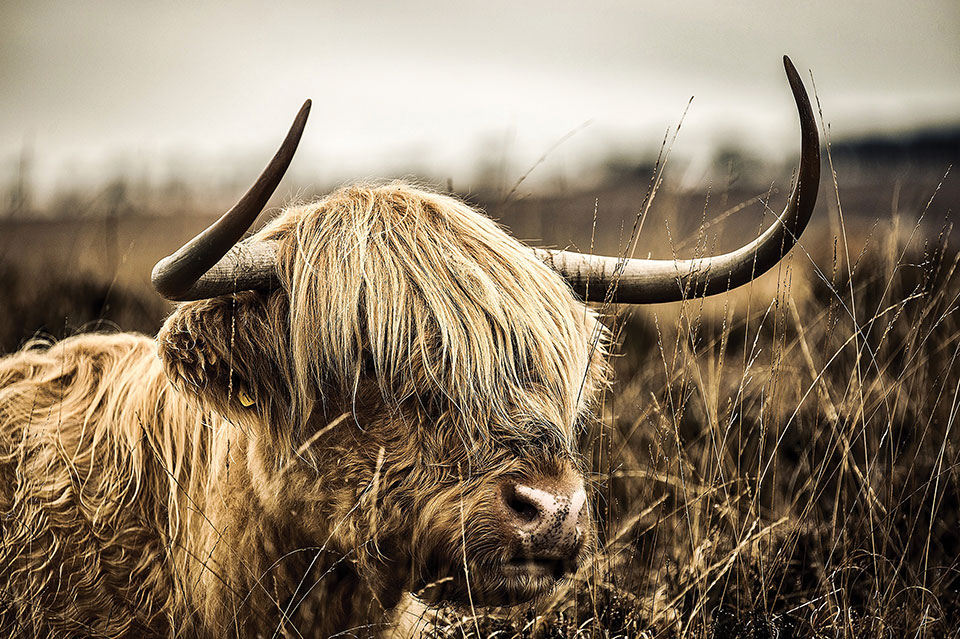 It must be said, too, that I was reluctant to leave a printed record. Who was I to upset the elemental balance of that place? The ocean claimed shrew bones; the wind beat cliffs clean of moss and grouse nests. Nothing was excessive, and as a result nothing was vestigial. There, a person could disappear. All his worldly holds, his possessions and feelings, could be wiped without any residue.
It must be said, too, that I was reluctant to leave a printed record. Who was I to upset the elemental balance of that place? The ocean claimed shrew bones; the wind beat cliffs clean of moss and grouse nests. Nothing was excessive, and as a result nothing was vestigial. There, a person could disappear. All his worldly holds, his possessions and feelings, could be wiped without any residue.
One morning, I kissed Esme Diane. The breeze was eerie, because it was discreet. She always called the wind sìth, a word for fairy in Gaelic. This twisted me up, because it made her seem primitive, so perfectly hayseed, and yet I knew that to be insincere. On that sìthless day, her lips did not apply any pressure to mine. Hers was the kiss of a conger eel. False intimacy is its own kind of abuse. That moment drove me quickly to depression. When she left to forage that day, I tried to throw myself from the bluff. But before I could do that, I felt a cow’s nose, slightly wet, slightly textured, on the back of my neck.
Damien leans against the bench’s backrest, a series of carved primate faces. His blends with theirs. Before long he is crying, and the bench goes from sweet and cartoony to menacing. When Damien is hurt, the whole environment grows dense, for hours or for days. His pain could make shards of a weatherglass. Though someone else has caused it this time, I am still left shouldering the guilt. Here I have been listening to his sniff-story without offering a pat on the shoulder, a kind banality, and it is my fault he is weeping.
We both mastered in linguistics, and I thought we had a mutual faith in efficiency
My nose starts to bleed. This has started to happen more often, when I am so overcome by frustration, or feelings of weakness, that I lose my words. When I stay silent, the force inside my head builds, and then that black-red seeps down to my lips. I do not have a handkerchief, so instead I hold the zoo program to my nostrils, staining its text on etiquette.
Damien sees what is happening. He is of a better kind, because the sight of my blood makes him stop crying and attend to me. What a boon that my body is speaking on my behalf, baring the airs and spirits I have been trying to hide. I calm down. The pressure in my sinuses gradually clears, making a channel for good, human breath. I ask Damien if I can take one of his smokes.
He hands me a menthol. I believe we are in the process of repairing what I have casually broken. To me, this is unspeakably important. I do not connect to people; I would not hesitate to call Damien my only friend. He dabs the offcuts of my nose-bleed and looks into my eyes. Based on precedent, I expect him to ask if I am okay. Instead he says, When we bought tickets from the zookeeper, you said, One for me and one for my schoolmate. Why didn’t you call me your friend?
Illogical, for him to go back in time like that. I do not understand the genesis of his current emotion. And now I am lost—I thought I knew what I had done to hurt him, and from there I thought I could forge a path to clemency. Pressure begins to mount again around my septum. I offer to find the zookeeper and tell him how much fun I’m having with my friend. Damien seems wounded by this suggestion, which to me completely defies reason.
A few minutes pass, during which time a mother buys her son peanuts to feed to a flock of gray parrots, and he lets some slip through his young fingers. She scolds him, which makes him cry. The parrots repeat what she has said, Clumsy boy, and only then does she look remorseful. She buys her son more peanuts, and though he feeds the birds without dropping a single nut, he is still crying about what happened before.
My friend lights my cigarette and then his. I choke down the scorch, those first few tokes nearly intolerable. But I want to put him at ease, so I work to tolerate them. We burn our smokes down to their filters. When he starts to speak again, either his voice is higher pitched or the pressure in my head is affecting my ability to distinguish between tones.
We will leave the cows where they are, he says. Because for a week Esme Diane took me on a dinghy to learn the bouldered shore, and worse, she refused to let me bring any books. She said we should use our own words more often. Aren’t we both smart enough? she asked. After weeks in the post-and-beam hut, I thought we had found the most isolated place in the world, but somehow she managed to strip us of even more comfort. Before we left, I found a chough that had cleft its skull on a rough stone, and with its blood I wrote Nocere on the dinghy, knowing the name would quickly wash away.
Bluer, sorer, nuder, hairier, freer, he is, my friend.
For that week I had migraines. I can style my words in any way, but my body will not take part in those fabrications. Which is why it seemed an insult that Esme Diane had perfect braids for the entire week, and the sometimes-violent airstreams only served to redden her lips. She remained impeccable in a two-piece flax suit, always the navigator, always the carrot at the bow of our boat.
At night we would pitch a cambric tent, despite the weather, because it was the only material she had brought. Each time a storm touched down, rain would perforate that thin shell. When that happened, I would implore Esme Diane to arch herself above me, as a second tent, which she would do until she was fatigued. Then it was my turn to perform the same service. In this way, we did our best, our mortal best, to protect each other from the immensity of the sky.
One island enticed both of us; on it were two patches of wild roses, defiant and scarlet despite the brutal weather. We did not need to say a word. We silently agreed to remain there, submissive to the rain, and after a few days, we reached a point where we could tell one another anything. Esme Diane had dropped the artifice of her innocence entirely, while for my part I admitted to a host of insecurities. Maybe one day—he turns to me—if you give me the opening, I will share them with you, too.
I start to look for the opening, but he cuts me off in a way that seems intentional. He says, It was incredible. It was the premier feeling of my life. Everything, my legs, my arms, my jaw, worked ideally every day. I was no longer sensitive to light and sound. Even cruelty could not make me cry. If I could be that open with everyone in my daily life, perhaps I would be able to endure small offenses. And I would not, then, be forced to see myself as some kind of exposed nerve.
Nothing was preconceived, you understand. Each time one of us spoke, the other listened and then decided if, and how, to respond. You have no idea how often interactions are informed by biases, how we believe people will answer. It was so freeing to just be met in each moment, and to meet her in each, regardless of our history of half-truth and deception.
It was safe there. We did not need to armor anything. But at some point Esme Diane decided we should continue on our travels. I was not sure why, since we were triumphant in our lone, island way—I knew my bliss was complete because I felt no compulsion to write, or not to write. In fact I did not think about my novel at all until we were back in the dinghy Nocere, and then those familiar sensations returned, the leaden stomach, the viscous breath, which someone might imprecisely name anxiety.
I was convinced I could not attain that level of intimacy with the broader world. I became disposed to suspicion and pain. Esme Diane steered us all the way back to Tongue Bay, and by the time we got there, my muscles had all but seized. I was nearly immobile. Esme Diane lay me down in some thread-moss and kissed me on the brow, before hoofing off to check on her rams.
Damien taps out another cigarette. I worry about him smoking so much. That feeling of concern, so rare to me, carbonates my skin. No one has taught me to be gentle, or to notice others’ subtle feelings. I am ever trampling living things, tiny, delicate twinflowers—Benandonner, bad for emotion and ecology. How strange, I think, that Damien appears to be ashamed of this greatest gift, his sensitivity. I am getting a small sense of that gift, in this worried moment. It must be a burden, but what a life-giving burden.
In the middle distance, a macaque bursts from its enclosure and clambers onto a little girl’s head. She is maybe six, unattended, with long fishtail braids that the monkey grips and pulls before slapping her face. My friend jumps to his feet immediately. I can’t process what I’m seeing, so I do not scream or stand; my cheeks feel warm, rare, and primate-slapped.
The girl is responding to the trauma by bawling, pulling from his grip. I can see her features getting taut as her scalp is drawn farther back. My friend has started to pace, and to phone someone who is not me, all the while edging closer to tears. He is taking a dynamic part in this chaos, which is not necessarily his chaos, but which perhaps seems to be a test of his goodness. I feel no such liability. Here, maybe, it is better to be Benandonner.
I choose this moment to apologize to Damien. Because so much is happening, the pressure to speak with precision begins to ebb and fade. I do not expect perfection of myself. Given the chaos of this scene, the disorder inside me seems appropriate. My body is five hundred temperatures, thirty colors; one part is lint and another satin; still my words, my tiny words, I can control.
I yell, over everything else that is happening, everything else that is always happening, I’m sorry.
Damien, whom I have known for a decade and who trusts me enough to tell me his fantasies, the saga of his love for Esme Diane, bucks wildly. I had been prepared for his coldness, to which I have grown accustomed, or for an uncorking of feeling. But not this: He runs toward the monkey and grabs him by his small, mannish hands, spinning the creature in a circle like a child unsure of how to release his aggression. The girl crouches, jerking her own braids just as the macaque had done. My friend does not seem to see this, or if he does, he is now too focused on his own involvement in the event to help her. I am disturbed by how quickly she has learned to hurt herself as that other creature has hurt her.
The macaque and my friend ring a ring of roses. How sad I will be if this monkey mauls his kind face, and he bleeds out, or realizes my friendship is not among his life’s imports. The mother with the peanuts is a few feet from the bench I had been sharing with Damien, though I did not see her move. She is sheltering her son’s face against her hip and watches the spectacle with a sort of mundane calmness, although it is not actually mundane to be calm.
After a while of this, the event staying orange and ugly, the woman staying pacific blue, I turn to her. I ask, Did you see what happened between me and him?
She hesitates. She evidently does not want to hurt me, and I find this reluctance flattering. She must think that I have hurtable feelings. I can tell you what happened in my opinion, she says.
I trust her, because in her failure to protect her son from tears I saw an image of myself. I don’t like that she failed, but I do like that she and I share this particular mortality. I ask, What do you think happened?
Zoo staff have emerged from various corners and cupolas, their matching polo shirts giving them an air of authority. They escort Damien back to the bench, just as the zookeeper pitches a potato sack over the monkey’s head. The woman, who has not yet started to articulate what happened, looks even more reluctant to do so. I encourage her by stroking the back of her arm, while Damien collapses by my other side, looking haunted.
She says, declining eye contact, It seems to me that you have something special and strange happening between you. And that is worth working through, precisely because it is hard.
I consider what she has said. And even after a long pause I can only draw one conclusion: The chaos in front of us will eventually give way to the cogent. The monkey in the sack, the gawking audience, the girl now yanking her own braids—this will eventually give way to the cogent.
I ask Damien, who is open-mouthed, still visibly haunted, Can you tell me more about the Highland cattle?
I am convinced this will work, because Damien is and always has been less afraid of pain than I am. Bluer, sorer, nuder, hairier, freer, he is, my friend. More audacious, and yet more amorous. He tells me he is not ready to talk about the cows just yet, but he will tell me as soon as he is.
It is not in my power or my interest to push him. I watch as the monkey is transported to a zoo vehicle, his curious head poking from the top of the potato sack. The mother releases her son’s face and sits on the bench beside me, the boy gladly clambering into her lap. He seems to find the whole thing hilarious, the chaotic vacationers, the darling creature peeking above the burlap.
Damien takes out a cigarette and flicks a flame onto its tip. A zookeeper comes to tell him he is forbidden to smoke, although he has been doing it all afternoon without repercussion. But after the monkey attack, the break in our collective sense of safety, the zookeeper is newly certain of his job’s importance. Damien blunts his ashes against the bench, then mimes smoking the cigarette until the official leaves. In this way he submits but does not bow down. After this, we are silent for a long time, perhaps fifteen minutes. It does not feel comfortable but neither does it feel excruciating, partly because the little boy beside us is babbling.
Damien says, By the time we got to Tongue Bay, I was nearly immobile. Then Esme Diane disappeared for four days. This was by far the worst stretch of my adult life. I had no food, and I only had one rain-basin’s worth of water. She had offered no time frame for her return. Remember, at that time my body was not banding with my mind, and so I genuinely thought that this was the end of my life’s haul. I started to read again, this time Mariama Bâ, So Long a Letter, which was both electrifying and intimidating. Her tongue was so sensitive; mine was entirely numb.
The chaos in front of us will eventually give way to the cogent.
I notice that Damien only reads in translation. And I feel it may be freeing to him for me to mention, now, that he is not reading one voice but at least two. But he did not ask for my part in this translation, and until I am confident about when and when not to interject, I will do my best to stay innocuous.
So I was just there, arid, reading Bâ, waiting for my love to hurry home. Did I mention this was the hardest time of my life? I started to talk to a tartan hanging from the roof beams. I would leave the two windows open, then read aloud to its woven threads, hoping the wind would animate it in a way that seemed conversational. I would ask the tartan to bring me water, or burnt cream, or nettle soup, and of course my desires were again and again thwarted by that rude textile.
Eventually, after a few of these lonesome days had passed, I saw the Highland cattle through one of the bare windows. They had waited for me. They had remained in that hostile part of the country. And for a long, holy moment it felt immaterial whether Esme Diane ever returned. Of course it was not—it mattered deeply, and would affect my quality of life moving forward—but because the environment was hospitable, even sympathetic, my lover’s absence was a dull ache and not a salted wound.
Of course my mouth watered when I looked at their loins, but I willed myself to be bigger than that hunger. Imagine my surprise when, on the fourth day, the day Esme Diane eventually returned, I saw one of the cattle balance herself on the dinghy Nocere and float to sea.
I am so frustrated by my complete inability to understand Damien, my only friend. He is stretching the truth so elastically, without even queuing me with a smile or a wink. I start to carve “What” into the wood bench between my legs. What what what, I carve. I notice he is looking at what I’ve written on the bench, and I have to take responsibility for that script, now that it is sitting in the plain sun.
He and I used to go to the campus gallery together, and sometimes when I did not understand a painting, or a poem set in neon, my nose would start to bleed. He would tilt my head to stopper the blood; by coincidence this would allow me to see the work from another angle. Sometimes, of course, it looked the same. Certain things are just unintelligible.
He looks from the What what what to me, and back. The longer he says nothing, the more tense I feel. The mother beside me is watching us nervously, chomping on a handful of her peanuts. Her son is looking at the sky, naming clouds in his little adenoidal voice, afterburner, brave man, wave-on-freaky-shore.
It is better to explain why you are hurt to someone who genuinely cares than to write them off because they hurt you in the first place.
Finally, Damien says, You remember Esme Diane, how she called me a bad fisherman?
And I say, Of course, Damien. That was how you started your story. Am I that bad of a listener?
He looks shocked by this question. He says, I would never stay friends with a bad listener. I love the way you pay attention.
Oh. I am not the kind of man who carries feelings. No, I think, I am not one to cry.
Damien does not seem to expect any response from me, so when he does not receive one, he simply continues. When she returned from those days away, he says, she had a new vocabulary. She had transformed into a poet. She had always been kind, and enkindled, but her demands had a lovely veneer, and that eased me into a deeper intimacy. Where, on the island, we had functioned by virtue of our rawness and protected time, once she returned we worked because we chose handsome, gracious language.
Listen, he says to me. I want to get close to you again. But we must find a way to keep each other safe.
Where has the child playing ring-around-the-roses gone? Who is this man that has appeared and opened us both?
From his pocket, he slides a band of titanium. Esme Diane had disappeared for four days to buy this, he says. She had played a disc of poetry in the car—I believe it was Paul Celan—and she had committed to memory the language she liked best. Not directly lifted phrases, mind you, but taken the comeliest nouns and verbs into her safekeeping.
Damien is now showing some tears. They are not because anyone has hurt him. They are his heart coming out of his eyes. Though I may not be able to feel exactly what he is feeling, I am able to notice that he is happy, and loved, and from that I am able to manufacture a sense of pride in his well-being. Congratulations, I say.
We sit there being simple, slowing the other’s day. He mimes smoking. I gather burrs from my pant legs. I gesture to the mother and her son, and Damien nods. So I invite the two of them, using a few careful words, into our conversation. The mother is stroking the boy’s hair, east to west, north to south.
I say to her, I think we need someone else in this conversation. Are you in a rush?
And she says, so generously, so handsomely, No. Let’s take some time together.
Her son is falling asleep, which is for the best, because we all want to protect him from hearing about our friction. He has already seen the vicious spectacle surrounding the macaque; he is so green, we want to hold him a while longer from the lashes of the world. At least until he has learned to be his own good news. So we listen to the mother sing a cradlesong until he is obviously asleep—counting rams, two by two—and then we lean in to our conversation.
I tell her, We will do just as much as we can until you have to go. Please do not feel a burden to stay. We will do just as much as we can.
She could easily ask how this would benefit her, and I am prepared to answer that question. But she does not. She says, pointing to Damien, You start.
He tells her the whole story he just told me, only he does so in an orthodox way, with no adornment or borrowed language. Bookends to the story: He disappeared because he was in love with me and I wounded him, and he agreed to see me upon his return because he had matured enough to realize one significant truth: it is better to explain why you are hurt to someone who genuinely cares than to write them off because they hurt you in the first place.
When he pauses, I say, Listen. It was a marvelous story you told me, but I don’t understand why you added so many flourishes and false doors.
He laughs. No one ever centers on one thing for long enough, he says. We can get to my lying. But unless we focus first on the ways I feel wronged, we will both leave empty.
The mother does not say anything to intervene, so I assume what he has said is valid. I believe, sincerely, that I will have a chance to speak later. My nose does not bleed.
The zookeeper has already written a sign for the monkey cage, which he is fixing to its bars. do not approach the animal. he may behave irrationally. And there, I see now, is the latch that allowed him to break free, just slightly juked to the left. There are so many ways the zookeeper could address the risk, instead of assuming the animal’s hostility—fixing the latch, for instance, if not reshaping the zoo environment, which is undeniably frantic. I could tell him now, in case the creature is provoked again, but that would likely backfire. I will wait until the zookeeper has calmed into his coherent self and I have decided, word for word, what I want to tell him.
In his sleep, the boy turns away from the cage, murmuring a phrase from his mother’s cradlesong. Maybe I cannot find the bramble path back to innocence. But I am learning not to hurt.
Toronto

